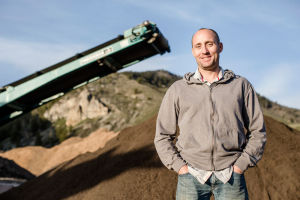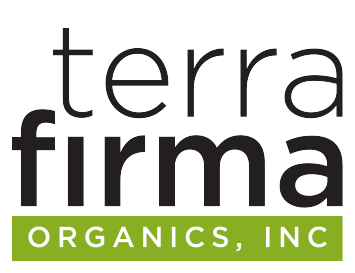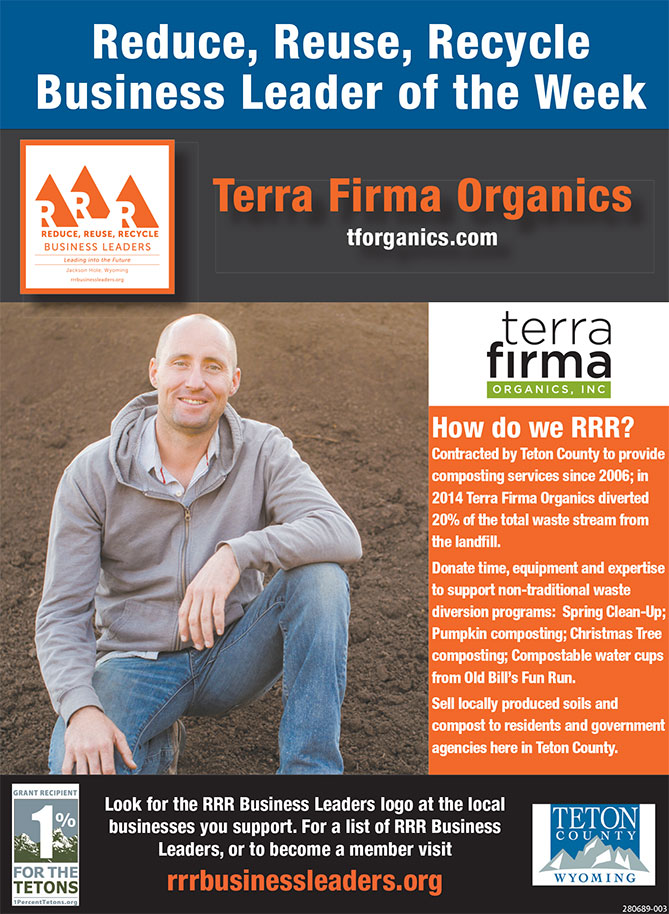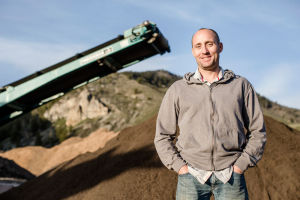Composting doesn’t just happen all by itself; it needs labor and smarts.
Jackson Hole News & Guide
May 21, 2014
By Richard Anderson
 Dane Buk talks about getting “back to basics” with his business, Terra Firma Organics.
Dane Buk talks about getting “back to basics” with his business, Terra Firma Organics.
“The whole reason behind that company is I believe in the basics,” the 35-year-old owner said. “Most people get away from the basics. They get so caught up in thinking beyond the basics that it gets confusing and it ruins the outcome.”
But as a tour of his business proves, getting back to basics can be complicated. In the case of the top soil, compost, mulch and other products he began selling commercially last weekend at an outdoor lot near Evans Construction, there is quite a bit of science involved and more than a bit of art.
Q: How did you come to start Terra Firma Organics?
A: I started a landscape design firm. We did everything from basic installation to helping people with how to lay out their landscape without the expensive costs of a landscape architect. I started that when I was 19. I’m from Casper. I came here to be a ski bum, but I just love the work. My father was dean of the College of Agriculture in Nevada. He’s an agriculturalist, sylviculturist and horticulturist. … I’m so lucky to have him. I didn’t go to college. I was working on a cattle ranch, and that was my life until I came up here … and started a landscape company.
When you start working with trees and plants, the next direction you go in is the soils. Aspens can handle high pH, which is why you see aspens with sagebrush. Spruce, evergreens, like acidic soils. … We started learning more about soil science without even knowing it.
Then I started a research nursery in Nevada where we propagate trees. … I’d find one I like here and clone it down there, not to see if the tree would grow in Nevada but to see if I could grow it there, mass produce it there and ship it back here. The environments are similar: It’s high desert, the organics in the soil are as low in Nevada as they are in Wyoming. The difference is Nevada, by Reno, had a longer growing season. A tree that would take 10 years to grow here, I could produce a cloned tree in three years there. I knew that if it could grow it there it would grow here.
And from there we got into good soils, soil science, worked into introducing that into our landscape design. That led to our compost facility. It was originally for my company, to make our products better.
Q: And then the county got interested in composting.
A: We had to convince Teton County to let us compost. It was the No. 1 waste diverter in Teton County. They’ve come around, and we’re one of the largest net revenues to Teton County on waste. We make them a lot of money. We help them keep their costs down.
Recycling costs money. It’s not a zero-cost product. It’s not like you put recycling into the bin and it turns into something for free. That’s not to say I don’t believe in recycling, but I’m the compost guy. I believe in efficiency and saving money as much as we can. If I were asked, “Would you like to recycle a plastic bottle or a sandwich?” I’d say a sandwich. A bottle is light. It doesn’t break down in the landfill to create new problems. The sandwich weighs the most. It produces leachates and methane gas. …
Cardboard, corrugated stuff, anything that had a life cycle, anything that lived. All we’re doing, we harness decomposition. Things decay naturally. It’s why we put preservatives in food. All we do is, we’ve perfected decomposition. The next step is to make sure what we have is safe. There are some things that are scary out there — things that reside in the soil. … We spend thousands of dollars to test to make sure they’re safe.
Q: What sort of hazards are there?
A: To kill the weeds they spread weed killer. A horse eats the grass, his manure comes to me. … So what we do is, we can make compost in six to eight weeks, but the process we’ve chosen, for site constraints and market demands, is we do it in two years. The longer it sits, the better it gets. It gives those microbes more time to break down and process all those pieces into humus, into microbe poop.
Q: So where does all that happen?
A: (In response, Buk makes a short trip to Teton County’s trash transfer station, above which sit a dozen or so small mountains of scrap lumber, lawn and yard waste, and organic material in various stages of decomposition.)
We do not mulch scrap wood — that’s a misunderstanding —and we do not compost dimensional lumber. What we do is construction and demolition material gets sorted. We have to make it so there’s no trash. If there’s any trash, you get a sort fee, we have to shut the floor down, have to clean it up. We’re not allowed to have trash up there. The [Wyoming Department of Environmental Quality] will shut us down. If that’s in the wood product we can’t get rid of it for waste energy. There are such strict rules.
Q: What happens to that wood?
A: [The wood is chipped] and goes off into a biomass power plant, where the wood is burned in an environment where it’s scrubbed and cleaned. It produces heat, which then makes steam, and the steam powers a plant in Idaho. We save them $3,000 a day. This is waste-to-energy.
That’s our woody brush pile — tree trimmings, brush material from companies, locally — and to the right is the grass pile. That [the brush] is our carbon source, and that [the grass] is our nitrogen source. We have proprietary recipes that go into our preblend. … Someone who has the perfect cookie, they have a really good recipe. Well, we have a really good recipe.
We blend these together, hydrate it and then turn it. … That to the right is Pile 10. That’s the preblend. This has been turned, and it’s getting ready to be screened to take all the wood out. … So then it’s blended with soil — subsoil. That’s all we have in Jackson. We have no top soil really.
(Top soil is the uppermost layer of earth, the so-called “O horizon,” Buk said. It is created by plants growing and dying and decomposing, over and over again, for thousands and millions of years. Even though Jackson Hole’s ecosystem has been at it for a long time, its O horizon contains just 0.5 to 1 percent organic material. Through its process, Terra Firma shoots for 6 percent organic content for its topsoil.)
We send it to the lab and the lab tells us the pH, the salts, the organic matter. From there we have a new recipe where we input our compost and other things to help that, so it’s a good growing medium.
Now I want a no-brainer blend with fertilizer. … They sent one batch design, a new product that will contain fertilizer at the right amount. It had all these ingredients in it, like three tablespoons of salt, three pounds of kelp per yard. It’s going to be pretty awesome. I don’t want the homeowner to have to figure that out — I know how hard it is to read a fertilizer bag. … In the past all we provided was soil medium. Now we’re realizing people don’t want to think at all. They want to buy it and grow stuff. We have such a short growing season, we’re trying to help take away the guess work. It makes us more successful and makes them happier, because it’s what they want.
Q: Who are your customers?
A: Most of the landscapers purchase from us, and the national park, too. We’re trying to get WYDOT to accept it. For the most part our product is really well-received because it works. That’s partly why we got out of landscaping. We had this bad-ass landscaping business, but people were not going to support Terra Firma because we’re competition. But I believe in this. … You get your soils right, you’ll be amazed what your plants will do.
View Article on JHNewsandGuide.com




 Dane Buk talks about getting “back to basics” with his business, Terra Firma Organics.
Dane Buk talks about getting “back to basics” with his business, Terra Firma Organics.